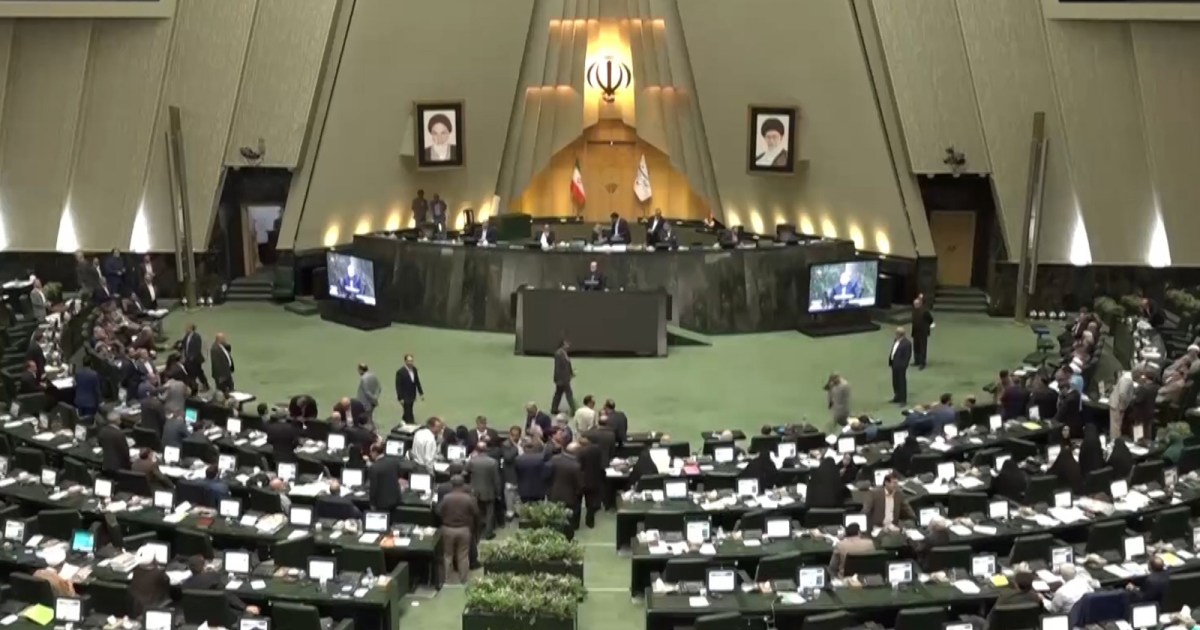TEHRAN -
With the succession of optimistic statements about the imminence of an agreement in the Vienna nuclear negotiations, the conservative Iranian parliament drew the red lines for any possible agreement with world powers, while the prominent reformist Mohammad Ali Abtahi accused the conservative movement of blocking the agreement until 6 months ago.
About 250 deputies in the Iranian parliament addressed a 6-point statement to President Ibrahim Raisi, stressing the need for the negotiating delegation to abide by them in the Vienna talks, and not to give up what they described as national interests.
Red lines
The statement called on the Iranian government to draw a lesson from the experience of the United States and the European Troika dealing with the Joint Comprehensive Plan of Action, and not implementing its commitments in it, and stipulated that Tehran would not commit to any agreement with these countries without taking the necessary guarantees.
The statement said that the United States and the European parties to the agreement must provide guarantees not to withdraw from it, and not to activate the dispute resolution mechanism to re-impose sanctions on Tehran.
The statement also indicated that it is the Iranian parliament that will allow the government to undo the steps to reduce nuclear commitments, after reviewing its report on lifting all sanctions in a verifiable manner, especially on the oil and banking sectors.
division of roles
A segment of Iranians believes that lifting the sanctions does not make sense if they do not include those that the Americans were counting on to paralyze the Iranian economy, and that the parliament's statement seeks to raise the government's balance in extracting the rights of the Iranian people from what the statement described as "arrogant forces."
In this context, political affairs researcher Mokhtar Haddad believes that the points demanded by Parliament aim to fortify the position of the Iranian negotiating delegation in the face of Western pressures, especially the United States, as the main culprit in obstructing the 2015 nuclear agreement.
In an interview with Al Jazeera Net, Haddad describes the American demands in the Vienna negotiations as "arrogance and flight forward," stressing that "Parliament wants to guarantee national interests and remove the specter of sanctions that affected the citizen's livelihood."
He points out that "the Iranians do not trust the United States after it withdrew from the nuclear agreement, and the obsession of blowing up any agreement that can be reached with the United States will continue to haunt the Iranians."
Message and goals
One of the goals of the Shura Council’s statement, according to Haddad, is to send a message to the American side about what the Iranian people want from their government and negotiating delegation, and to push the negotiations to reach an agreement that guarantees their national interests.
He points out that there are some thorny issues in the Vienna negotiations, including lifting sanctions and verifying their practical cancellation, ensuring that the nuclear agreement is not violated again by Washington, and expecting a convergence of views during the coming period.
Haddad clarifies that reviving the nuclear agreement is closely linked to Iran's national security and its supreme national interests, and that "the negotiating delegation does not need to reconcile the red lines at home with Western pressures to reach a settlement."
Parliament vs. Congress
The Iranian parliament’s letter to President Ibrahim Raisi reminds a similar letter to a number of Republican representatives in the US Senate to President Biden, warning them that they will work to block any new nuclear agreement with Iran, if his government does not allow Congress to review and vote on its terms.
In this context, prominent reformist activist Muhammad Ali Abtahi describes the statement of the conservatives in the Iranian parliament as "a political maneuver to record a role for him in the planned agreement, after obstructing it during the previous government and compromising national interests."
And he says, in his speech to Al-Jazeera Net, that the statement's focus on the need to lift sanctions on the oil and banking sectors reveals Tehran's soft side in the face of Western pressures, explaining that "the conservative movement realized after reaching power that sanctions on the oil and banking sectors constitute the biggest challenge facing the country." at the present stage."
Abtahi describes the statement as contradictory because it accuses the United States and the European troika of not implementing any of their commitments in the 2015 nuclear agreement, and then again demands that these parties provide guarantees that the dispute resolution mechanism will not be activated.
contradictory demands
Abtahi points out that the nuclear agreement allows the withdrawal of any of the signatory parties to it, in addition to allowing the Western parties, along with China and Russia, to activate the dispute resolution mechanism.
He concludes that the conservative parliament wanted to divide the roles to support the Iranian government in its negotiations with world powers, but its dark view regarding the implementation of the parties to the planned nuclear agreement "suggests that it is more appropriate for the government to stop its negotiations aimed at reviving the agreement."
In light of the imminent announcement of the revival of the nuclear agreement, reports from Vienna still indicate that a number of outstanding issues remain in the negotiations, while Iran and the United States are throwing the ball in each other's court to make political decisions to make the negotiations successful.

